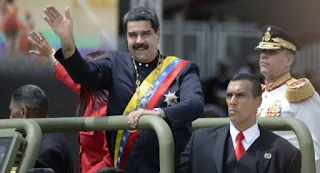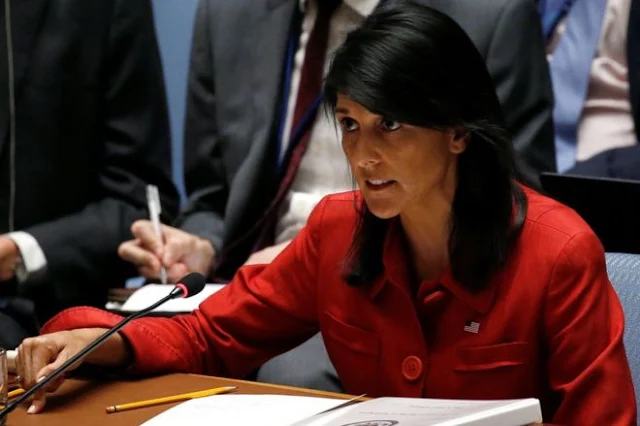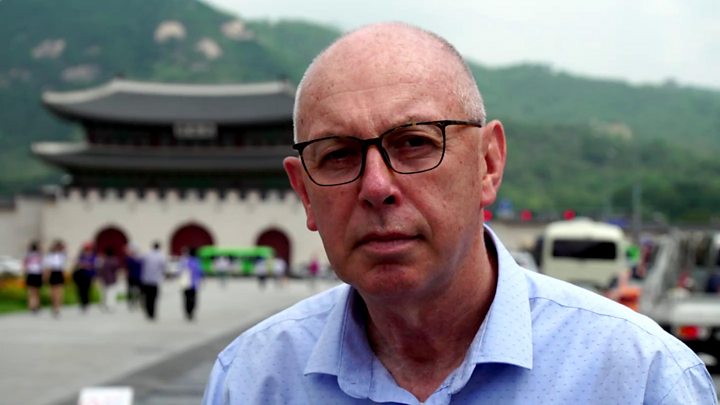US President Donald Trump and Russia's Vladimir Putin have met for the first time, shaking hands at the start of a G20 summit in Hamburg, Germany.
They will hold a longer meeting later, and say they want to repair ties damaged by a crises including Russia's alleged meddling in the US election.
Climate change and trade are set to dominate as the two-day summit opens, with mass protests in the streets.
Clashes at a "Welcome to Hell" rally left 76 police officers injured.
By choosing to hold the summit in Hamburg, Germany's northern hi-tech powerhouse, Chancellor Angela Merkel is seeking to show mass protests can be tolerated in an open democracy, correspondents say.
The G20, or Group of Twenty, is a summit for 19 countries, both developed and developing, plus the EU.
The individual countries are Argentina, Australia, Brazil, Canada, China, France, Germany, India, Indonesia, Italy, Japan, Mexico, Russia, Saudi Arabia, South Africa, South Korea, Turkey, the UK and the US.
What can we expect from the Trump-Putin talks?
The two leaders are due to meet in the afternoon for an hour, Russian media say, though other reports suggest it could be about 30 minutes.
It is unclear if they will speak to reporters afterwards or to what extent media will be admitted to the meeting. After phone calls between the leaders in January and May, the White House and Kremlin released summaries of the conversations.
- Trump-Putin meeting imagined
- Donald and Vladimir: How do they compare?
- What we do know is that the two men have staked out opposing views on major international issues in the run-up to the summit:
- On Thursday, Mr Trump used a speech in the Polish capital Warsaw to call on Russia to stop "destabilising" Ukraine and other countries, and "join the community of responsible nations"
- Setting out his own G20 agenda in German financial newspaper Handelsblatt, Mr Putin called for US-led sanctions, imposed in response to Russia's annexation of Crimea in 2014, to be lifted on his country
- Mr Putin also argued strongly in favour of the Paris climate agreement, saying it was a "secure basis for long-term climate regulation" and Russia wanted to make a "comprehensive contribution to its implementation". President Trump, of course, has taken America out of the agreement.
While there was less mention of Syria, Washington supports some armed opposition groups, while Moscow is the main ally of President Bashar al-Assad, so the potential for a difference of opinion there too is high. - Mr Trump's choice of words aimed at Russia in his Warsaw speech suggests he recognises the political danger of being seen as too close to Mr Putin, the BBC's diplomatic correspondent James Robbins says.Russian media have low expectations of the meeting with one observer, Fyodor Lukyanov, writing in Rossiyskaya Gazeta: "The main thing is that nothing gets worse".
Will climate change overshadow the summit?
Canadian Prime Minister Justin Trudeau has urged G20 leaders to impress upon Mr Trump that he should act as a role model in addressing climate change."We'll tell him it's important to take a lead role in tackling climate change and creating good jobs," he told German tabloid Bild, according to Reuters news agency.Mrs Merkel has said the G20 will focus on the Paris climate deal but, as the G20 host, she will work to find compromises.UK Prime Minister Theresa May is expected to challenge President Trump over climate change by saying that the Paris Agreement should not be renegotiated.What else is being discussed?
Jean-Claude Juncker, head of the European Commission, said the EU would respond "immediately and adequately" if the US tried to impose punitive tariffs on European steel imports.In a dig at Mr Trump, he said a new EU-Japan trade deal signed on Thursday showed Europeans were not putting up "protectionist walls".Mrs Merkel and other EU leaders have expressed their commitment to an open international trading system, while the Trump administration pursues protectionism under the "America First" motto.Why are protesters so angry?
Demonstrators could be seen gathering again in Hamburg on Friday morning, to the beating of drums, as businesses surveyed damage to shop fronts and firefighters hosed down freshly burnt cars. -
Brick by brick, wall by wall, make the fortress Europe fall," protesters chanted as they marched again.The city's squats have long been a base for leftist militants but up to 100,000 people from Hamburg and beyond were expected to gather during the summit to protest against capitalism, war and climate change.One protester, Dirk Mirkow, was asked by German broadcaster Deutsche Welle why he was demonstrating."For example because Donald Trump denies climate change," he replied. "And because the richest eight men own as much as a large percentage of the world's population."In Thursday's clashes, which continued into the night, police charged at masked protesters at the "Welcome to hell" march, which was attended by 12,000 people.
- Police fired water cannon and pepper spray at masked protesters, who hurled bottles, stones and flares.Medics were seen treating several people. At least one person appeared to have been seriously hurt and was carried away covered by a foil blanket.
- BBC NEWS














